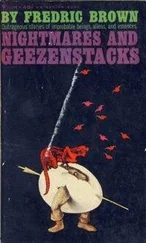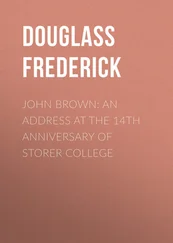Fredrick Brown - Night of the Jabberwock
Здесь есть возможность читать онлайн «Fredrick Brown - Night of the Jabberwock» весь текст электронной книги совершенно бесплатно (целиком полную версию без сокращений). В некоторых случаях можно слушать аудио, скачать через торрент в формате fb2 и присутствует краткое содержание. Жанр: Фэнтези, на английском языке. Описание произведения, (предисловие) а так же отзывы посетителей доступны на портале библиотеки ЛибКат.
- Название:Night of the Jabberwock
- Автор:
- Жанр:
- Год:неизвестен
- ISBN:нет данных
- Рейтинг книги:4 / 5. Голосов: 1
-
Избранное:Добавить в избранное
- Отзывы:
-
Ваша оценка:
- 80
- 1
- 2
- 3
- 4
- 5
Night of the Jabberwock: краткое содержание, описание и аннотация
Предлагаем к чтению аннотацию, описание, краткое содержание или предисловие (зависит от того, что написал сам автор книги «Night of the Jabberwock»). Если вы не нашли необходимую информацию о книге — напишите в комментариях, мы постараемся отыскать её.
Night of the Jabberwock — читать онлайн бесплатно полную книгу (весь текст) целиком
Ниже представлен текст книги, разбитый по страницам. Система сохранения места последней прочитанной страницы, позволяет с удобством читать онлайн бесплатно книгу «Night of the Jabberwock», без необходимости каждый раз заново искать на чём Вы остановились. Поставьте закладку, и сможете в любой момент перейти на страницу, на которой закончили чтение.
Интервал:
Закладка:
It was still loaded with bullets that were in it when we'd made the deal four or five years ago, and I didn't know whether they'd still shoot or not, but I put it in my trouser pocket. I wouldn't use it, of course, except in dire extremity — and I'd miss anything I shot at even then, but I thought that just carrying the gun would make my coming conversation seem dangerous and exciting, more than it would be otherwise.
I went into the living room and he was still there. He hadn't poured himself a drink, so I poured one for each of us and then sat down on the sofa again.
I lifted my drink and over the rim of it watched him do that marvelous trick again — just a toss of the glass toward his lips. I drank my own less spectacularly and said, "I wish I had a movie camera. I'd like to film the way you do that and then study it in slow motion."
He laughed. "Afraid it's my one way of showing off. I used to be a juggler once."
"And now? If you don't mind asking."
"A student," he said. "A student of Lewis Carroll — and mathematics."
"Is there a living in it?" I asked him.
He hesitated just a second. "Do you mind if I defer answering that until you've learned — what you'll learn at tonight's meeting?"
Of course there wasn't going to be any meeting tonight; I knew that now. But I said, "Not at all. But I hope you don't mean that we can't talk about Carroll, in general, until after the meting."
I hoped he'd give the right answer to that; it would mean that I could get him going on the subject of his mania.
He said, "Of course not. In fact, I want to talk about him. There are facts I want to give you that will enable you to understand things better. Some of the facts yon already know, but I'll refresh you on them anyway. For instance, dates. You had his birth and death dates correct, or nearly enough so. But do you know the dates of the Alice books or any other of his works? The sequence is important."
"Not exactly," I told him. "I think that he wrote the first Alice book when he was comparatively young, about thirty."
"Close. He was thirty-two. Alice in Wonderland was published in eighteen sixty-three, but even before then he was on the trail of something. Do you know what he had published before that?"
I shook my head.
"Two books. He wrote and published A Syllabus of Plane Geometry in eighteen sixty and in the year after that his Formulae of Plane Trigonometry. Have you read either of them?"
I had to shake my head again. I said, "Mathematics isn't my forte. I've read only his non-technical books."
He smiled. "There aren't any. You simply failed to recognize the mathematics embodied in the Alice books and in his poetry. You do know, I'm sure, that many of his poems are acrostics."
"Of course."
"All of them are acrostics, but in a much more subtle manner. However, I can see why you failed to find the clues if you haven't read his treatises on mathematics. You wouldn't have read his Elementary Treatise on Determinants, I suppose. But how about his Curiosa Mathematica?"
I hated to disappoint him again, but I had to.
He frowned at me. "That at least you should have read. It's not technical at all, and most of the clues to the fantasies are contained in it. There are further — and final — references to them in his Symbolic Logic, published in eighteen ninety-six, just two years before his death, but they are less direct."
I said, "Now, wait a minute. If I understand you correctly your thesis is that Lewis Carroll — leaving aside any question of who or what he really was — worked out through mathematics and expressed in fantasy the fact that — what?"
"That there is another plane of existence besides the one we are now living in. That we can have — and do sometimes have — access to it."
"But what kind of a plane? A through-the-looking-glass plane of fantasy, a dream plane?"
"Exactly, Doctor. A dream plane. That isn't strictly accurate, but it's about as nearly as I can explain it to you just yet." He leaned forward. "Consider dreams. Aren't they the almost perfect parallel of the Alice adventures? The wool-and-water sequence, for instance, where everything Alice looks at changes into something else. Remember in the shop, with the old sheep knitting, how Alice looked hard to see what was on the shelves, but the shelf she looked at was always empty although the others about it were always full — of something, and she never found out what?"
I nodded slowly. I said, "Her comment was, `Things flow about so here.' And then the sheep asked if Alice could row and handed her a pair of knitting needles and the needles turned into oars in her hands and she was in a boat, with the sheep still knitting."
"Exactly, Doctor. A perfect dream sequence. And consider that Jabberwocky — which is probably the best thing in the second Alice book — is in the very language of dreams. It's full of words like trumious, manxome, tulgey, words that give you a perfect picture in context — but you can't put your finger on what the context is. In a dream you fully understand such meanings, but you forget them when you awaken."
Between "manxome" and "tulgey" he'd downed his latest drink. I didn't pour another this time; I was beginning to wonder how long the bottle — or we — would last. But he showed no effect whatsoever from the drinks he'd been downing. I can't quite say the same for myself. I knew my voice was getting a bit thick.
I said, "But why postulate the reality of such a world? I can see your point otherwise. The Jabberwock itself is the epitome of nightmare creatures — with eyes of flame and jaws that bite and claws that catch, and it whiffles and burbles — why, Freud and James Joyce in tandem couldn't have done any better. But why not take it that Lewis Carroll was trying, and damned successfully, to write as in a dream? Why make the assumption that that world is real? Why talk of getting through to it — except, of course, in the sense that we invade it nightly in our dreams?"
He smiled. "Because that world is real, Doctor. You'll hear evidence of that tonight, mathematical evidence. And, I hope, actual proof. I've had such proof myself, and I hope you'll have. But you'll see the calculations, at least, and it will be explained to you how they were derived from Curiosa Mathematica, and then corroborated by evidence found in the other books.
"Carroll was more than a century ahead of his time, Doctor. Have you read the recent experiments with the subconscious made by Liebnitz and Winton — the feelers they're putting forth in the right direction, which is the mathematical approach?"
I admitted I hadn't heard of Liebnitz or Winton.
"They aren't well known," he conceded. "You see, only recently, except for Carroll, has anyone even considered the possibility of our reaching — let's call it the dream plane until I've shown you what it really is — physically as well as mentally."
"As Lewis Carroll reached it?"
"As he must have, to have known the things he knew. Things so revolutionary and dangerous that he did not dare reveal them openly."
For a fleeting moment it sounded so reasonable that I wondered if it could be true. Why not? Why couldn't there be other dimensions besides our own? Why couldn't a brilliant mathematician with a fantastic mind have found a way through to one of them?
In my mind, I cussed our Clyde Andrews for having told me about the asylum break. If only I hadn't learned about that, what a wonderful evening this one would be. Even knowing Smith was insane, I found myself — possibly with the whisky's help — wondering if he could be right. How marvelous it would have been without the knowledge of his insanity to temper the wonder and the wondering. It would have been an evening in Wonderland.
And, sane or crazy, I liked him. Sane or crazy, he belonged figuratively in the department in which Mrs. Carr's husband worked literally. I laughed and then, of course, I had to explain what I'd been laughing about.
Читать дальшеИнтервал:
Закладка:
Похожие книги на «Night of the Jabberwock»
Представляем Вашему вниманию похожие книги на «Night of the Jabberwock» списком для выбора. Мы отобрали схожую по названию и смыслу литературу в надежде предоставить читателям больше вариантов отыскать новые, интересные, ещё непрочитанные произведения.
Обсуждение, отзывы о книге «Night of the Jabberwock» и просто собственные мнения читателей. Оставьте ваши комментарии, напишите, что Вы думаете о произведении, его смысле или главных героях. Укажите что конкретно понравилось, а что нет, и почему Вы так считаете.












